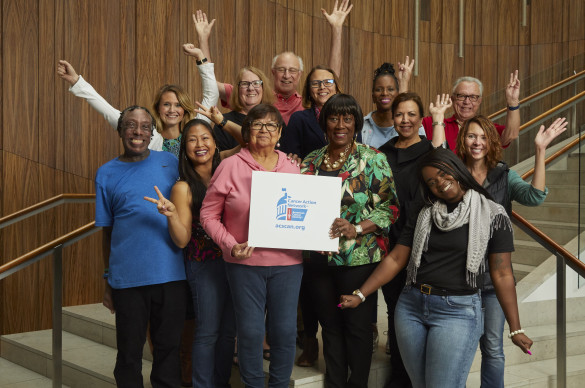FOR MORE INFORMATION, CONTACT:
Amber Hillman 508.450.8690 (cell)
[email protected]
American Cancer Society Cancer Action Network
Governor Charlie Baker, Mayor Marty Walsh,
MGH’s Dr. Jeffrey Engelman and Paul Guzzi
Advocate for Cancer Research Funding
American Cancer Society Cancer Action Network Brings Together Political Leaders, Cancer Community, in Calling for Increased Federal Funding for Advanced Breakthrough Treatments
June 1, 2015 –BOSTON – American Cancer Society Cancer Action Network (ACS CAN), the advocacy affiliate of the American Cancer Society, today hosted its 8th annual New England Research Breakfast at the Revere Hotel in Boston, with guest speakers Governor Charlie Baker, Boston Mayor Martin Walsh and Dr. Jeffrey Engelman from Massachusetts General Hospital.
Presented by EMD Serono and moderated by WCVB news personality Pam Cross, the breakfast brought together more than two hundred leaders from the business, education, medical, government and research communities to advance ACS CAN’s mission to make cancer a national priority. The event focused on the need for Congress to restore federal funding for cancer research through the National Institute of Health (NIH) and National Cancer Institute (NCI) so that progress can continue against a disease that still kills an estimated 1,500 people in America each day.
“NIH & NCI funding is a good thing for our economy – but there’s more to it than that” said Governor Baker, who shared multiple personal connections to cancer. “I think about all the people who are alive today because of research breakthroughs, and all the people who will be alive thanks to research – and know we can’t look at this through a purely economic lens. There are much bigger issues at stake here, and we can all picture the names and faces associated with increased research funding.”
Among those names and faces was Tara Shuman, a breast cancer survivor from Canton, who spoke about her experience battling cancer at today’s event. Diagnosed as a young mother of two at the age of 32, Shuman attributes her survival of an aggressive form of breast cancer to early breakthroughs in cancer research. “I always supported federal funding for research but it wasn’t until I got cancer myself that I actually appreciated its significance. I amalive and standing here today because of events like this one,” said Shuman. “I have no doubt my survival is due to NIH funding for cancer research and because of doctors and researchers who dedicate their lives to discovery.”
“I’m fighting to increase funding for the NIH and renew our nation’s commitment to research. This is the best investment we can make for health and for our economy,” continued Shuman. “We are all just One Degree away from cancer – we all know someone who has been affected by this disease – and for every one of us who loves someone who has been hit by cancer, this is our best way to fight back.”
More than 80 percent of federal funding for the NIH and NCI is spent on biomedical research projects at research facilities across the country. In FY 2015, researchers in Massachusetts received $2.3 billion in NIH funding, which supported more than 32,800 jobs across the state.[i] However, federal funding for medical research has declined more than 24 percent in inflation-adjusted dollars since 2003, forcing cancer centers to halt promising clinical trials and drying up the grant pool relied upon by researchers.
“Cancer research offers hope to the millions of people who face this dreaded disease – hope for better treatments, for more opportunities to prevent and detect the disease early, and for improved quality of life for those already diagnosed,” said Shalini Vallabhan, vice president of government relations for ACS CAN in New England, “but advancements could be in jeopardy if reductions in federal funding slow or halt the progress of new grants and promising research in the pipeline.”
Recently, the American Cancer Society Cancer Action Network (ACS CAN) and Stand Up To Cancer (SU2C) combined forces to launch the One Degree campaign to ask Congress to increase medical research funding at the National Institutes of Health by $6 billion over two years, including $1 billion for cancer research at the National Cancer Institute. Breakfast attendees were urged to visit the project website, OneDegreeProject.org, and share their One Degree by entering the name of a loved one with cancer in an electronic petition that will be sent to Congress.
About ACS CAN
ACS CAN, the nonprofit, nonpartisan advocacy affiliate of the American Cancer Society, supports evidence-based policy and legislative solutions designed to eliminate cancer as a major health problem. ACS CAN works to encourage elected officials and candidates to make cancer a top national priority. ACS CAN gives ordinary people extraordinary power to fight cancer with the training and tools they need to make their voices heard. For more information, visit www.fightcancer.org.
###
